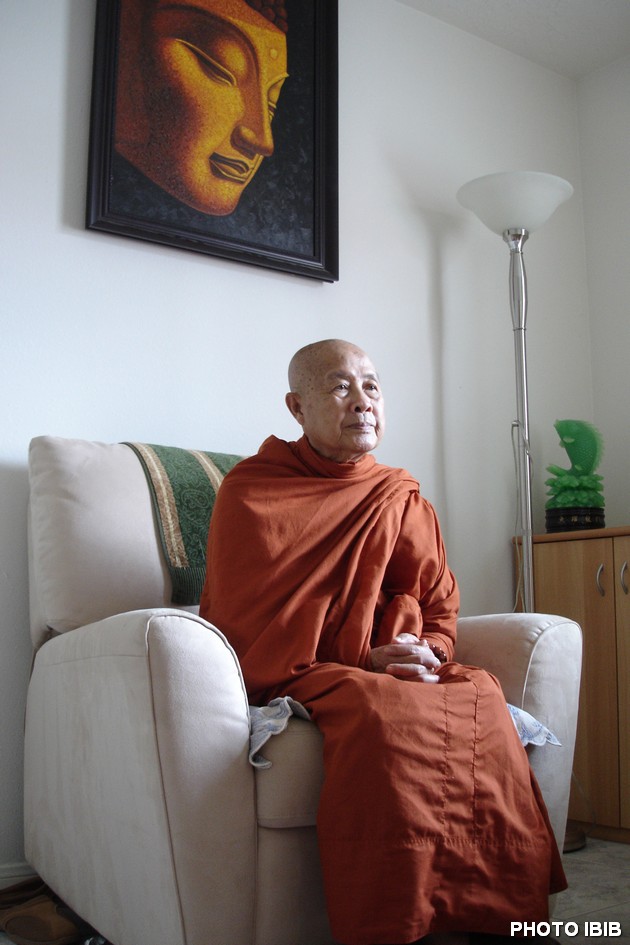PARIS, 30.11.2012 (IBIB) – The International Buddhist Information Bureau is sad to announce that the Most Venerable Thich Ho Giac, Deputy Patriarch of the Unified Buddhist Church of Vietnam (UBCV) died at the Phap Luan Temple in Houston, Texas at 6.19am on Wednesday 5 December 2012 at the end of a long illness. He was 84 years old. A funeral ceremony will be held at the Phap Luan Temple in Houston on 16 December 2012.
Most Venerable Thich Ho Giac devoted his life to religion and service. Born on 14 January 1928, secular name Ngo Buu Dat, Thich Ho Giac entered monastic life when he was five years old after his mother died and his father became a monk. Most Venerable Thich Thien Luat, his father, became a prominent figure of Vietnamese Buddhism. One of the first monks to introduce Theravada Buddhism to Vietnam, he was appointed Deputy Patriarch of the UBCV, a title that would later be granted to his son.
 |
|
The Most Venerable Thich Ho Giac
(Photo IBIB) |
Most Venerable Thich Ho Giac was a brilliant student. He graduated with honours from the Institute of Advanced Sanskrit Studies in Phnom Penh, and continued his studies in Burma and Sri Lanka. From 1954-56, he was chosen as one of 2,500 most learned monks to take part in the Sixth Buddhist Council in Rangoon, Burma, to review and record the official version of the Tipitaka, or teachings of Lord Buddha.
After studying abroad for many years, he returned to Vietnam to become the very first Secretary-general of the Theravada Buddhist Sangha and found the Phap Quang Buddhist Institute, one of the principal schools for the formation of Theravada Buddhist monks.
In 1963, he was imprisoned for playing an active role in the Buddhist struggle against religious discrimination under the Ngo Dinh Diem regime. In 1964, when the Unified Buddhist Church of Vietnam (UBCV) held its first congress, Thich Ho Giac was amongst the UBCV’s founder members, holding titles such as Head of the Commission on Social Affairs, Head of the Commission on Lay-Buddhists, Head of the Commission on Dissemination of the Faith.
In 1967, he was Buddhist Deputy Chaplain General in the army of the Republic of (South) Vietnam.
In 1981, after the Communist regime banned the UBCV and created the State-sponsored Vietnam Buddhist Sangha, Thich Ho Giac was obliged to flee Vietnam across the Cambodian border. He was granted asylum in the United States in 1982.
In 1983, along with eight other UBCV leaders in exile, he founded the Overseas Leadership Council of UBCV, of which he was Secretary-general. The following year, he was appointed President of the Executive Committee of the General Association of Buddhists in the USA.
In 1992, following an appeal launched by the UBCV’s Third Supreme Patriarch Thich Don Hau to unite Buddhists around the world in an international movement to support the repressed UBCV in Vietnam, Thich Ho Giac joined with other monks and lay-Buddhists to found the Vietnamese American Unified Buddhist Congress in the USA. Shortly afterwards, at the demand of the Fourth Supreme Patriarch Thich Huyen Quang, this became the foundation stone of the Overseas Office of the Unified Buddhist Church of Vietnam, with representatives all over the world. Most Venerable Thich Ho Giac was appointed President, a title he conserved until 2011, when he stepped down due to ill health.
In 1997, he was appointed Supreme Patriarch of the Overseas Theravada Buddhist Sangha.
In 2008, as a mark of great respect, the UBCV Bicameral Council of Institutes in Vietnam elevated Most Venerable Thich Ho Giac to the post of UBCV Deputy Patriarch. This was the first time an overseas UBCV official received such a high title in the UBCV leadership.
Most Venerable Thich Ho Giac was among the UBCV’s most respected leaders, a renowned and eloquent speaker, and a learned scholar, with 27 published books and five major works awaiting publication. He was a father figure and a mentor to many Buddhists, and will be remembered for his tolerance, kindness and spirit of reconciliation.
This post is also available in:
 Quê Me Quê Me: Action for democracy in Vietnam & Vietnam Committee on Human Rights
Quê Me Quê Me: Action for democracy in Vietnam & Vietnam Committee on Human Rights



